Jilly Cooper and Elisabeth Frink
Also in today's (rather long) blog
The cost of front page book trade ads
Visiting Jilly C's website
Q&A with Douglas Kennedy
Tess Gerritsen's view of UK book trade
I wonder if Jilly Cooper and Elisabeth Frink ever met and, if so, if they liked each other?
Born, seven years apart, into the English upper middle class of the Thirties, which produced so many interesting, brave and eccentric characters, they are both on my list of the life-enhancing women of my time.
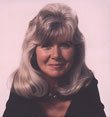
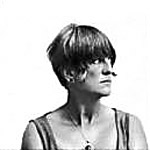
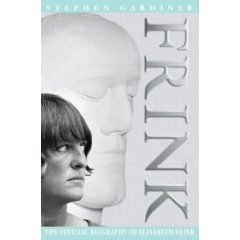
To the great sadness of her admirers, Frink died in her early sixties. Recently I've been re-reading two excellent books I bought when they first came out.
Frink : A Portrait by Edward Lucie-Smith and Elisabeth Frink, published by Bloomsbury in 1984
and
Stephen Gardiner's official biography, Frink, published by HarperCollins in 1999.
Even if you didn't care for her sculptures, do read one or both. She was an extraordinary woman.
The cost of front page book trade press ads
When the 27 January issues of The Bookseller and Publishing News dropped through my Spanish village letterbox, the front and inside-front covers of both magazines were advertisements for Jilly's new book Wicked! A Tale of Two Schools, to be hardbacked by Bantam Press in May.
Curious to know what this fanfare had cost, I enquired. The Bookseller's front cover costs £6,580 and the inside front cover £3,290 which adds up to £9,870 plus Value Added Tax. The combined cost of PN's front and inside front cover is £4,500 from January-July and £1,850 from August-December. So the two ads cost Transworld a lot of money and may well be considered brilliant by advertising experts. This reader found them disappointingly dull.
Both front covers were white space with It's play time…written across the middle in large letters. From the lower curl on the last letter dangled a striped silk tie.
Silk ties may be eye-catchers for men, particularly if they're "old school" or regimental, but I shouldn''t have thought they have much appeal to women.
The continuation of this advertisement on the inside front covers read "…with Jilly's wicked new bestseller". Alongside the book's jacket is written -"Two very different schools with one thing in common - extra curricular activities. The stunning, sexy new novel from Jilly Cooper."
In the past, Jilly has often featured in advertisements for her books. I remember a marvellous Publishing News front page ad for her book Score! [29 January 1999] with Jilly in a strappy black evening dress and diamanté choker reclining across the bottom of the page, looking glamorous.
But the UK seems to be increasingly ageist and maybe now, with her 70th birthday on the horizon, the people in Transworld's marketing department have decided it's better to keep her out of sight. A view that will not be shared by her admirers.
Of course most of the VIPs at Transworld have changed since PN published a photo [8 December 1995] of Jilly and ten Transworld people - including Paul Scherer, then MD - and Patrick Janson-Smith sitting on a bed at their conference hotel in Cyprus, drinking champagne and smiling at the camera held by the then deputy MD Mark Barty-King.
There is much to like about Jilly's website, but also some serious flaws. There's no contact link so her fans can't email the author. Her biographical details can't be copied and pasted by journalists, although the texts of several short stories can be copied. I went in search of the designer, Angus Scott, but his email link didn't work.
Q&A with Douglas Kennedy
Was my hunch [See last Sunday's blog] about Douglas Kennedy's entry for the £10,000 RNA Award proved right when the short list was published on Friday?
No, much to my disappoint and no doubt his, it wasn't. It was the book by the only other man on the long list, Nicholas Sparks, which was selected. However Sarah Broadhurst, The Bookseller's pundit, [see photo] includes Kennedy's book State of the Union [July from Arrow] in her list of Giants for 2006, Giants being books with the potential to hit the top 10 of the bestseller lists.
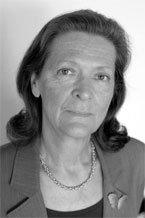
When he returned from his recent trip to the US, I asked Douglas Kennedy three questions.
Q : Why no website?
A : There are two in the offing - one from my French publishers, and another one here. You're right - I should have had one up-and-running by now, and have been amiss in that department.
Q : Are you happy with your book being defined as a romantic novel? [I ask this because it has been known for an author to accept the award, pocket the cash and then disclaim that their winning novel is a romance]
A: I'm happy with my book being defined as 'romantic', 'serious', 'tragic', 'high readable', whatever. 'Romantic' perhaps has a pejorative meaning - but to not me. Schumann and Brahmns, for example, were labelled Romantic composers - and according to the Oxford English Dictionary, romantic can be defined as 'inclined towards or suggestive of the feeling of excitement and mystery associated with love'. And since I often grapple with that theme in my books...
Q : Why are you living in London rather than in the US? I'm interested because one of my favourite writers, Lee Child, is British but has made his home in America.
A : I went to Trinity College Dublin. I returned to Ireland for a two week visit in 1977 and have lived on this side of the pond since then. The primary reason I stayed was love - I met my wife, Grace Carley, in Dublin in 1983, we married two years later and moved to London in l988 (the year my first book was published in the UK). I now divide my time between London and Paris - not a bad equilibrium... and I am very much at ease in Europe. But I get back to the States five times a year - even after 29 years away, I do still feel very American.
Looking for info about Kennedy's wife, I came across a report of their wedding in the New York Times archive.
Grace Carley to Wed Douglas L. Kennedy
Published: December 16, 1984
Mr. and Mrs. Frank D. Carley of Cork and West Cork, Ireland, have announced the engagement of their daughter, Grace Patricia Carley, to Douglas Lawrence Kennedy, a son of Mr. and Mrs. Thomas J. Kennedy of New York. The wedding is to be in April.
Miss Carley, an alumna of University College, Cork, is an executive assistant at the Irish Film Board in Dublin. Her father is a management consultant and her mother, Irene Carley, is an occupational therapist.
Mr. Kennedy, a playwright and film producer, was formerly an administrator of the Abbey Theater in Dublin. He graduated from the Collegiate School and magna cum laude from Bowdoin College. His father is a consultant in New York to the metals industry, president of the Copper Club in New York and past president of Geominerals, a trading company in New York. His mother, Lois Braun Kennedy, is president of the Central Park Precinct Community Council in New York.
I also found
Grace Carley grew up in Cork City and began a career in the film business as Director of Marketing with the Irish Film Board. She subsequently moved to London and founded a financing and distribution company for independent feature films, working with a range of emerging directorial talents including Peter Jackson and Bryan Singer. Twenty eight films and fifteen Cannes Film Festivals later, she sold her company and became a civil servant, joining the Department of Culture, Media & Sport in 2002 as a senior advisor in its Policy Innovation and Delivery Unit. She was appointed Head of Arts Funding and Organisation in 2003 with particular responsibility for Arts Council England, National Company sponsorship and the Culture and Regeneration agenda. She is a graduate of University College Cork and holds an MBA from London Business School.
Tess Gerritsen's view of UK book trade
Thriller writer Tess Gerritsen's blog was recommended to me by Liz Fielding and I found it interesting to read American author Gerritsen's view of British book trade discounting following her recent UK book tour. She wrote
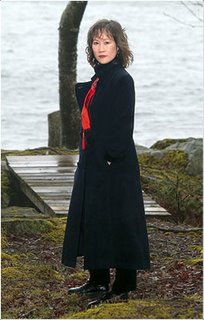
"I was startled by the extent of discounting in the UK. In all the bookshops, you'll find "3 for 2" paperback displays. You can buy three of the titles for the price of two. In the US, bookshops generally sell brand new paperback titles at cover price, and only in the warehouse clubs will you find paperbacks discounted deeply.
Even more startling were the new hardcovers selling at half price. (In the US, the deepest discount I've ever seen, in warehouse clubs, is 40%, which gives the clubs just a sliver of a profit.) Even Patricia Cornwell's latest title, which you'd think would sell well even at list price, was being offered in the UK at 50% off. How on earth can a bookstore make any profit off those sales?
The answer: they can't. They just break even. The deep discounting, I was told, is a way for stores to get customers in the door. You lure them in with a half-price Cornwell, and hope they stay to buy other books. But in this desperate bid to attract foot traffic, UK bookshops may be setting off their own death spiral, because now customers EXPECT a 50% discount on all hardcovers. They think it's normal to pay half-price for a hardcover, and will balk when a book is sold at list price.
If you're an author, this means that there's no way to get your book on a UK bestseller list unless the bookshops offer your book at a deep, deep discount.
Like the US, the UK is seeing a growing market share of book sales going out of grocery stores and non-traditional outlets. About a third of my American hardcover sales, I've found, have gone out of warehouse clubs such as Costco and Sam's. In the UK, I discovered that almost 40% of BODY DOUBLE's paperback sales and 20% of VANISH's hardcover sales went out through Tesco's, a UK national grocery store chain. Not surprising, really, when you think of the convenience; everyone needs to shop for groceries. Why not throw a book in the cart at the same time?
After dealing with US publishing numbers, the UK numbers may seem small. The week I was there, the number one bestselling paperback title (by Sophie Kinsella) sold 32,000 copies. BODY DOUBLE sold about 23,000 copies and it hit #4 on the London Times bestseller list. The number one hardcover (by Conn Iggulden) sold about 4700 copies. VANISH sold 3700 copies -- and, amazingly, hit #2 on the London Times list! Small numbers, but very, very sweet."
